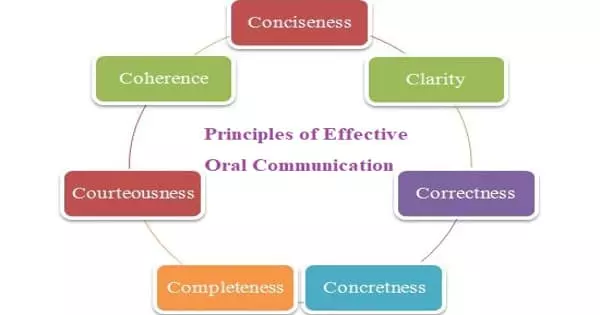Successful or effective oral communication necessitates the presence of certain principles in the communication in order to overcome flaws and eliminate the causes of oral communication failure. Before giving any speech, conduct research on the audience and subject to help you plan your oral presentation. It compels us to assess the audience and prepare the tone with which we will communicate or impress them. It may assist us in covering all of the points that we wish to present. It also aids us in the design of the sequence.
Principles of effective oral communication –
- Well-Planned
Our speech will be more effective and impressive if we give a well-planned oral presentation. Before presenting something, proper planning should be done with regard to the audience, the topics to be delivered, the timing, and other factors: As a result, a person must be well-prepared to deliver a speech.
- Clear pronunciation
Make an effort to speak in a clear, logical, and sequential manner. Words must be clearly and correctly pronounced for oral messages to be meaningful to receivers. Ask yourself questions like, “How do they sound?” and “Are they immediately understandable?” There should be no ambiguity in the communication; otherwise, it will be perplexing. Unorganized ideas do not provide a clear idea to the audience and confuse them.
- Brevity
As you move through your oral communication, use carefully worded transitions. A message must be brief in order to be effective in oral communication. If the sender took a long time to speak, his message may have gone unnoticed by the receiver.
- Precision
Oral communication requires precision to be effective. Someone may like to ask questions during a conversation, so be aware of this and try not to be disrupted. There should be no ambiguous words; rather, the message should be specific so that there is no misunderstanding.
- Natural voice
Any unnatural voice has the potential to distort the message. When using natural voice, the message may be distorted; when using unnatural voice, the message may be distorted. Communication would be more effective if we used nature’s voice. A natural voice can do a lot to improve the effectiveness of oral communication. Clear Pronunciation: Make sure you can speak and pronounce clearly, or else communication will be muddled.
- Logical sequence
To make the message communicative and appealing, ideas should be organized sequentially. You should maintain coherence in your presentation when presenting your points to others. The hierarchical sequence of message delivery is referred to as coherence. Unorganized ideas do not provide a clear sense, whereas a logical sequence of ideas does.
- Suitable words
In oral communication, words can have different meanings to different people in different situations; therefore, you should only use common, simple, natural, and familiar words to ensure audiences understand you correctly. Words have different meanings to different people in different situations. When communicating orally, a speaker should use common, simple, and familiar words so that the receiver can respond to the message without difficulty.
- Courteous
Courtesy is free but can earn you a lot of money. As a result, when addressing listeners, a speaker should be courteous. When you express your thoughts to someone, the outcome should always be positive. It aids in the creation of a favorable impression of the speaker in the minds of the listeners. Make certain that your speech does not convey any negative emotions. When you speak, be as polite as possible.
- Attractive presentation
It improves the effectiveness of oral communication. It is yet another principle for effective oral communication. You should deliver his speech in a pleasant and sweet language so that the audience can actively participate in the communication. A speaker should deliver his speech in a very nice and sweet language in order to entice the receiver to participate in the communication.
- Avoiding Emotions
To make oral communication effective, the speaker must control his emotions. Use ear-friendly language in your presentation, and avoid cramming too much information onto your presentation slides. Audiences must hear important information from your speech rather than from your slides. Too much emotion will divert the speaker’s attention away from the main topic.
The visualization and action steps will be included in the conclusion. It will return to your goal as it develops. In your closing, the best method is to use illustration and application to picture the audience’s experience of the purpose. Furthermore, objective information, listener capacity, interesting language, and proper fluency should be considered as principles of oral communication.
















